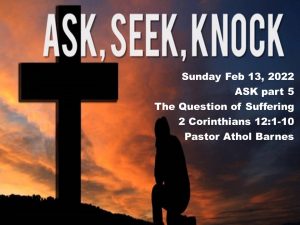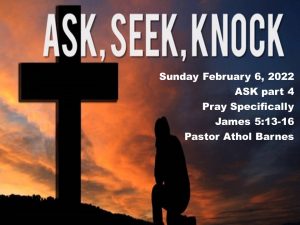
How often do you think about your name?
Research seems to suggest that your name has a significant impact on your life. People are judged by their names based on past positive or negative experiences.
Jesus identified himself with many different metaphors during his ministry. We will be looking at these “I am” statements over the next few weeks.
In John 8, Jesus was addressing a group of Jewish religious leaders. The interaction was becoming aggressive, and Jesus was not holding back. In fact, in verse 44 he accused the religious leaders of being children of Satan. In return, they called him a demon possessed Samaritan in verse 48. For a Jew to be called a Samaritan was the ultimate insult.
Jesus doesn’t seem moved by their insults, and he immediately makes a profound statement, “…if anyone keeps my word, he will never see death.” John 8:51.
The religious leaders go back to the father of the nation, Abraham, and the fact that he died and so did all the prophets. Essentially asking Jesus, “Who do you think you are?”
Jesus responds in John 8:54-56 with some incredible statements.
Firstly, Jesus told them that God is his father, while Abraham is their father. Every Jew would say that Abraham was their father, Jesus was beginning to reveal his true identity.
Then he said that Abraham saw him in that day. How did Abraham “see” our Lord’s Day, that is, his life and ministry on earth? This is answered in Hebrews 11:10.
God did not give Abraham some special vision of our Lord’s life and ministry, but He did give him the spiritual perception to “see” these future events that he was hoping for in faith.
They begin to understand where Jesus is going and push back with logic in verse 57, “…You are not yet fifty years old, and have you seen Abraham?”
Jesus makes a simple statement that causes the room to go into chaos, “Truly, truly, I say to you, before Abraham was, I am.”
Jesus was declaring his eternal nature, his pre-creation eternal existence. He was and is God.
Their response was understandable under the Mosaic law. Jesus had committed blasphemy and deserved to die. They picked up stones to kill him, but Jesus supernaturally evaded their attack. His hour had not yet come.
Jesus was directly revealing himself to the religious leaders, but they were blinded by their religion. The same is true for many people who attend churches all over the world today. They have a knowledge of Jesus, they have religion, but they have no relationship with the Lord. They have no desire to have a daily growing relationship with Jesus.
These religious leaders are the people who crucified Jesus Christ. Jesus called them the children of the devil. Whose child are you? (John 1:11-12).
Why was Jesus’ statement so provocative? (“before Abraham was, I am”)
To understand this, we need to go back to Exodus 3, and the call of God to Moses. God tells Moses to go to Pharoah and instruct him to release the children of Israel. Moses asks God for His name in order to let the people and Pharoah know under who’s authority he was speaking to them. This leads to the most powerful revelation of God in the Bible up to this point, “God said to Moses, “I am who I am.” And he said, “Say this to the people of Israel: ‘I am has sent me to you.’” (Exodus 3:14)
Up to this point in the Bible, God has been called in the Hebrew, Elohim which means God. But now God says, “I am WHO I am.”
“I am” is present tense. God has no past, present or future, everything about God is the eternal present.
The two words “I am” are pronounced in Hebrew as havah, and in verse 14, God identifies himself as, “Yahweh has sent you”. From this time onwards God is known by this statement, “I am Yahweh” this is the name God calls himself. A name that is so holy that most Hebrew people do not even pronounce it. The Hebrew people would regard the name as so Holy they would simply say Adonai, meaning, Lord.
The name of God, “Yahweh”, speaks of his eternal existence, his majesty, and his nearness. What a promise for Moses as he considered the call of God on his life.
Jesus declared that he is, “I AM”, and even speaking in Aramaic, the religious leaders determined that he was blaspheming the name of God, and they determined to end his life by stoning him. This was in keeping with the Old Testament law found in Leviticus 24:14.
But it’s not blasphemy if it’s true. And it is true. Jesus is “I AM!”
We learn four things from this declaration of Jesus.
1. Jesus is God
Jesus was born of a virgin, conceived by the Holy Spirit. He did not carry the sin nature that was passed down to all generations through Adam. Jesus knew no sin, and as a result his sacrifice on the cross for our sins was perfect and sufficient to atone for all our sins.
2. Jesus saves.
In the Exodus, Yahweh kept his promise and led the children of Israel out of slavery, across the Red Sea and ultimately into the promise land.
The name, “Jesus”, in Hebrew is “Yeshua”, which means, “Yahweh Saves”.
Jesus leads us out of slavery to sin and ultimately into the Promised Land of eternity in his New Kingdom where we will be with him forever.
3. Jesus is present.
The “I AM” is forever present. He is with you right now. If you are a follower of Jesus, you have the presence of the Spirit of Christ in your life, you are never alone.
4. Jesus will give us his name.
In Revelation 22, John is given a vision of our life in the new kingdom. And in verse 4 he writes, “They will see his face, and his name will be on their foreheads.”
Will you have the name of Jesus on your forehead in that day?



